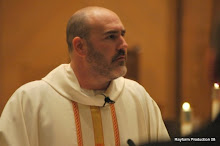"Our dignity rests, above all, on the fact that we are called to communion with God" [sic]
I worded this so badly, so many times, but I'm going to try again...
The sentence above is a bit confusing to me: I can see some of our dignity resting on the fact that we are called to communion with God, but "above all"?
What of all creation? Isn't all creation called to communion with God? Where does the dignity of the angels lie in "above all"?
I'm out of time, feel free to comment on this, or on whatever stands out to you from paragraphs 26-49
Wednesday, June 3, 2009
Subscribe to:
Post Comments (Atom)

Perhaps "above all" in this sentence does not refer to the human person being "above all" other aspects of creation being called to communion, but rather refers to the call to communion as the source of our dignity that is "above all" the other sources. For example, the human person has dignity because he/she has free will, the human person has dignity because he/she can reason, but "above all" the human person has dignity because he/she is called to communion with God.
ReplyDeleteWow...Nice!
ReplyDeleteI absolutely loved section IV(articles 39-43) of this chapter. I think we could spend an entire evening discussing it.
ReplyDeleteWhat follows is a brief summary mixed with commentary.(I hope it all makes sense.)
1. We have the ability to talk about God.(art. 39)
2. Our language about God is limited since we are limited in our knowledge and we must begin our discussion of him from the starting point of created things. (art. 40)
3. Since each created thing has its own perfection, and that perfection is a reflection of God’s perfection, we can then use that perfection to describe God. For example, we can say God is like a lion or God is a rock because we have no idea what He is like in himself, but we know that the perfection of ferocity in a lion and of stability in a rock are reflections of something of his divine perfection and can thus be used to describe part of him. (art. 41)
4. Yet God transcends all creatures and therefore we must continually purify our language otherwise we will fall into error about what we believe about God.(art. 42)
5. Even though our words fall short, they do attain to God. But “between creator and creature no similitude can be expressed without implying an even greater dissimilitude.” Does this imply that every word we speak about him is more wrong than it is right? To say God is love then is true, but it is more wrong than right? Is this because love is the best word we have for what God is, but our word and idea of “love” really falls so far short of what He is it will probably seem silly when we really encounter him?(art. 43)
St. Thomas’ quote at the end is what I really loved. “We cannot grasp what he is, but only what he is not.” So is it more true to say that God is not evil, then to say God is good? Is it more true to say that God does not hate, then to say God is love? My use of “love” and “good” is as true as I can speak about God in the positive sense, but these words are more false than they are true?
For example, if I bring a grain of sand to a man who has never seen a mountain and tell him that this is what Mt. Everest is made of, would that man be more accurate in saying that Mt. Everest is not a valley, then if he said Mt. Everest is like a grain of sand?
Bonus Question: If the Catechism says we can grasp or attain to knowledge of God, but we can only grasp what he is not, are we really grasping God with our mind, or is the knowledge that we gain an indirect or deduced knowledge based on the picture that is formed by learning what he is not?
Super Bonus Question: If our words for God are more false than true, is it a truer statement to say that God is not love, than to say God is love? (obviously not, but why not? -or is there a sense in which this is a true statement.)
I left this chapter thinking that I should remind myself of the limitations of every word I use for God on a regular basis to prevent myself from creating a limited caricature of him in my mind.
In light of these commments, its interesting to me that our music and liturgy switched from a focus on awe to a focus on likeness.
ReplyDeleteIs the switch a cause or an effect of the attitude, so prevelant in our culture that God is best defined as "One of us"?
Is our worship a classic "over-correction"? What is the answer then to help us be more balanced in our understanding and speaking about God?